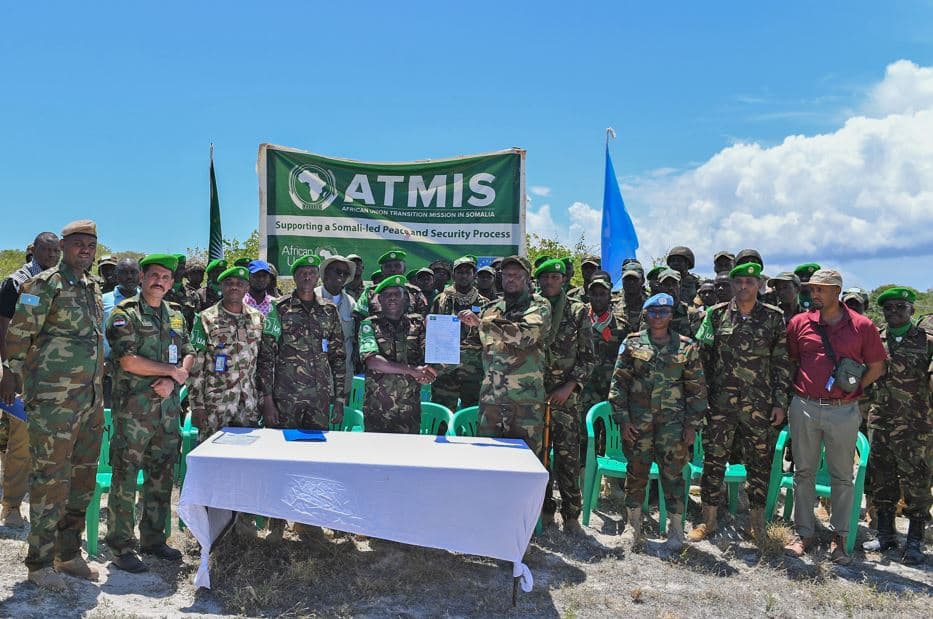We're loading the full news article for you. This includes the article content, images, author information, and related articles.
Reduced financial support for the African Union Support and Stabilisation Mission (AUSSOM) in Somalia threatens to undermine regional stability and reverse hard-won security gains, according to the Kenya Defence Forces (KDF).

The Kenya Defence Forces (KDF) has voiced significant concern over dwindling financial allocations for critical peacekeeping operations, cautioning that these cuts could imperil ongoing regional and global stability efforts. The warning comes amidst revelations that financial shortfalls are already hindering the operational efficiency of the African Union Support and Stabilisation Mission (AUSSOM) in Somalia, potentially weakening its capacity to maintain security achievements.
Major General Mohamed Hassan, the Kenya Army Deputy Commander, highlighted these challenges during the 2025 United Nations Troop Contributing Countries (UNTCC) Army Chiefs Conclave in New Delhi, India, held from Monday, October 14, to Wednesday, October 16, 2025. He underscored that Kenya, a long-standing contributor to global peacekeeping, has directly observed the adverse effects of inadequate resources on mission effectiveness.
Major General Hassan affirmed Kenya's unwavering commitment to fostering peace and stability across Africa and beyond. However, he stressed the urgent need for reforms to ensure peacekeeping missions are more responsive to contemporary challenges. He stated, "As one of the longest-serving troop-contributing countries, Kenya’s experience has shown us that the future of peacekeeping depends not just on the number of troops, but on rethinking our approach to mandates, partnerships, lasting political solutions, and adequate funding."
Kenya's involvement in Somalia began in October 2011 with Operation Linda Nchi, a military intervention launched following a series of cross-border attacks and kidnappings by Al-Shabaab militants. The operation, approved by the Kenyan Parliament under then-President Mwai Kibaki, aimed to degrade the Al-Qaeda-affiliated group and secure Kenya's national interests. In February 2012, Kenyan forces were formally integrated into the African Union Mission in Somalia (AMISOM).
AMISOM transitioned to the African Union Transition Mission in Somalia (ATMIS) on Friday, April 1, 2022, as part of a planned phased withdrawal of forces and a handover of security responsibilities to Somali security forces. This year, ATMIS further evolved into the African Union Support and Stabilisation Mission in Somalia (AUSSOM), with its mandate set to expire in December 2025.
The funding crisis for AUSSOM is a critical issue, with a reported shortfall of approximately $180 million. The mission was largely expected to be financed through the UN-assessed contributions pool via the 2023 UN Security Council Resolution 2719 funding mechanism. However, the UN Security Council did not authorise the implementation of this resolution in May 2025, primarily due to opposition from the United States, which cited concerns over burden sharing.
This has left AUSSOM reliant on short-term pledges from a limited number of donors, undermining funding certainty and the mission's long-term viability. The European Union, historically a major donor, has indicated it may not sustain previous levels of support, reflecting shifting international priorities.
Kenya's Prime Cabinet Secretary and Foreign Affairs CS Musalia Mudavadi has also warned that the widening financing gap poses a serious threat to AUSSOM. He has advocated for a hybrid financing model anchored on UN-assessed contributions to ensure predictability and effectiveness, stating that financial uncertainty emboldens extremist groups and risks reversing hard-won gains.
Kenya received KSh 958 million in reimbursements for its troops in Somalia during the financial year ending June 2025. This marks a significant increase from KSh 86 million in the 2023-2024 financial year but remains considerably lower than previous peaks, such as KSh 8.9 billion in 2020-2021.
The funding cuts could lead to a reduction in the global peacekeeping force. The United Nations is preparing to cut its global peacekeeping force by a quarter, repatriating approximately 13,000 to 14,000 troops and police, and reducing the peacekeeping budget by about 15 percent this year. This reduction, largely influenced by significant US funding cuts, will impact several missions, including the UN support office in Somalia. Such a reduction could exacerbate instability in Somalia and the broader Horn of Africa region, potentially allowing extremist groups like Al-Shabaab to regain ground.
The long-term sustainability of AUSSOM remains uncertain without a predictable and comprehensive financing mechanism. The debate over the application of UN Resolution 2719, which provides a framework for financing AU-led peace operations, continues to be a point of contention among international partners.
The UNTCC Army Chiefs Conclave 2025, where these concerns were raised, concluded on Wednesday, October 16, 2025. The mandate for AUSSOM is set to expire in December 2025.
The international community will be closely watching for developments regarding the financing of AUSSOM and the broader implications of UN peacekeeping funding cuts. Discussions surrounding a sustainable financing model for AU-led peace operations, particularly the implementation of UN Resolution 2719, will be crucial. The effectiveness of the Somali National Army in assuming full security responsibilities as the transition progresses will also be a key area of focus.
Keep the conversation in one place—threads here stay linked to the story and in the forums.
Sign in to start a discussion
Start a conversation about this story and keep it linked here.
Other hot threads
E-sports and Gaming Community in Kenya
Active 9 months ago
The Role of Technology in Modern Agriculture (AgriTech)
Active 9 months ago
Popular Recreational Activities Across Counties
Active 9 months ago
Investing in Youth Sports Development Programs
Active 9 months ago
Key figures and persons of interest featured in this article